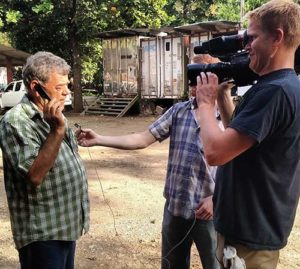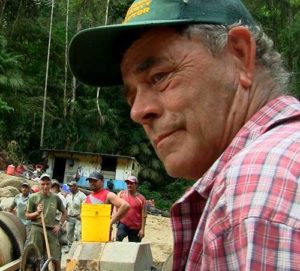MILWAUKEE — In the words of Milwaukee moviemaker Colin Sytsma, Capuchin Fr. Wally Kasuboski possesses a “diverse skill set.”

Filmmakers interview Capuchin Fr. Wally Kasuboski during filming of “From Mass to the Mountain,” a documentary film that will be shown during the Sept. 22-Oct. 6 Milwaukee Film Festival. (Submitted photo courtesy Kurt Sensenbrenner)
For Brooklyn, New York-based Kurt Sensenbrenner, co-director with Sytsma of a film about the priest who’s gone from the Ripon-area farm of his childhood to many years of ordained missionary service in Panama, one can be “awed” observing that skill set in action – seeing Fr. Kasuboski celebrating Mass and then, an hour later, acting as foreman on a construction site.
Both undertakings, Sensenbrenner said, exemplify the “humble” priest’s “helping the silent majority, the underrepresented community” to which the Capuchin has ministered for nearly three decades.
A press release emailed by Sensenbrenner points out that Fr. Kasuboski (known in Panama, where the name Wally is virtually nonexistent, as Padre Pablo), who has a law degree, began his current assignment in 1988 and “deep in the Panamanian jungle (discovered) something he never expected: a community that was literally dying of thirst.”
In a country approximately the size of South Carolina, the area became “impoverished” through “decades of government corruption and neglect,” according to the release. The spiritual leader from Wisconsin became a temporal leader as well.[su_pullquote align=”right”]If you go
“From Mass to the Mountain” will be screened during the Sept. 22-Oct. 6 Milwaukee Film Festival.
Saturday, Sept. 24, 12:30 p.m., Avalon Theater, 2473 S. Kinnickinnic Ave., Milwaukee;
Thursday, Sept. 29, at 7 p.m., Fox-Bay Cinema Grill, 334 E. Silver Spring Drive, Whitefish Bay;
Tuesday, Oct. 4, at 3:30 p.m., Landmark Oriental Theatre, 2230 N. Farwell Ave., Milwaukee.
The filmmakers also invite churches and Catholic schools to show the documentary. Sensenbrenner can be contacted at kurt@masstomtn.com. For information, visit masstomtn.com or mkefilm.org. [/su_pullquote]
The Sensenbrenner-Sytsma production is titled, “From Mass to the Mountain.” It debuted in the U.S. Sept. 16, at the Harlem International Film Festival in New York City, after its world premiere in Panama. “From Mass” is scheduled to play three times in the next couple of weeks at the eighth annual Milwaukee Film festival. Fr. Kasuboski and its co-directors are slated to attend each of the showings.
Fr. Kasuboski attended Adams Elementary School and Ripon High School, both in Ripon, before entering St. Lawrence Seminary, Mt. Calvary. He joined the Capuchins in 1967 and was ordained a priest in June 1974 at St. Francis of Assisi Church, Milwaukee, by Campbellsport native, Bishop Salvador Schlaefer, a missionary in Nicaragua.

Capuchin Fr. Wally Kasuboski’s missionary work in Panama is the subject of “From Mass to the Mountain,” a documentary film that will be shown three times during the Milwaukee Film Festival, Sept. 22-Oct. 6. (Submitted photo courtesy Kurt Sensenbrenner)
In a three-way telephone conversation, Sensenbrenner and Sytsma spoke with the Catholic Herald about their movie and the missionary it documents.
“Our film just scratched the surface,” conceded Sytsma. “This film is about a priest in Panama for the past 28 years protecting the rainforests and fresh watersheds to bring drinkable water to an ignored population.” He continued, “It’s an inspirational story, in some ways a heavy story, but there’s a lighter side –not only to the film, but to Fr. Wally himself.”
In their downtime on location in Panama for 43 days during 2015-16, the filmmakers listened to the Capuchin’s stories of being stalked in the jungle by tigers and making daylong trips on horseback between mission outposts. Asked about lessons learned, Sytsma said, “The biggest one for me: If you don’t have anything to die for, do you have anything to live for?”
One request the good-natured priest made of the filmmakers was not to portray him as a saint.
“From Mass” is, according to Sytsma, a “point-of-view film,” rather than a journalistic one, expressing the viewpoints of Fr. Kasuboski and “the people that surround him.”
Early on, the priest is introduced to viewers, as is “the lay of the land, what’s going on down there (in Panama)” – background intended so that subsequent scenes like the building of a dam in the jungle will “make sense.” A geographical focus is Torti, a rural subdivision with a population approaching 10,000. Moviegoers will hear conversations and observe meetings and construction work.
Sensenbrenner and Sytsma met as film students at the University of Wisconsin-Milwaukee. Sensenbrenner grew up in Ripon, where, he noted, Fr. Kasuboski “is kind of a mini-celebrity.” Sensenbrenner is not Catholic (nor is Sytsma); Sensenbrenner’s father is, however, and over the years, son Kurt would see Fr. Kasuboski preaching at dad’s church, Our Lady of the Lake in Green Lake, in the Madison Diocese.
The Capuchin’s standard message back home constituted a call for listeners to “help alleviate the suffering in other people’s lives,” Sensenbrenner recalled.
In 2011, Sensenbrenner joined a volunteer group that traveled from the Ripon area to Panama to labor with Fr. Kasuboski for about 10 days; such trips are yearly occurrences.
“He’s very hands-on,” Sensenbrenner said of the missionary who formed a construction company in his adopted country and trained some of his congregants to operate bulldozers and cement trucks.
A college student at the time of his first Panama visit, Sensenbrenner supplemented the heavy lifting by doing about 10 hours of filming, something he hadn’t planned. He now had a documentary subject; a work partner (Sytsma) was on the horizon. Additional visits to Latin America followed.
The filmmaking partners, in addition to directing “From Mass,” served as cinematographers and editors; Sensenbrenner was the producer. Over the phone, he spoke favorably of “telling real people’s stories,” which Sytsma echoed, “documentary is where our passion lies.”
